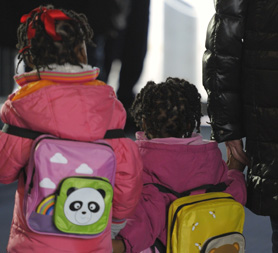Ministers scrap adoption race barriers
As new adoption guidelines remove barriers between children and potential parents, a charity tells Channel 4 News the move should ease “the sense of abandonment”.

The new policy was announced by the Education Secretary, Michael Gove, who was himself adopted as a baby.
He said the main aim of the changes is to get children placed with adoptive families more quickly and avoid them spending too long in the care system.
“Thousands of children are currently in the care system waiting to be adopted,” he said. “Every day they wait is a day they are denied the loving home all children deserve. Edicts which say children have to be adopted by families with the same ethnic background are denying children the love they need. This misguided nonsense punishes those who most need our help and that is why this Government is sweeping it away.”
Adoption placements are currently falling, with the number of children placed in adoptive families down by 15 per cent between March 2009 and March 2010. The problem of finding families is worse for black children, who take an average of 50 per cent longer to be placed than children from other ethnic backgrounds, according to government figures.
And the older a child gets, the more likely they are to get stuck in local authority care. Last year children over five were four times less likely to be adopted than younger children.
‘Racism was rife but things have moved on’
The Who Cares Trust is a charity working with young people in care. Chief Executive Natasha Finlayson told Channel 4 News that it had become less important for children to be placed with parents of the same ethnicity.
“A lot of the research the original policy was based on was done in the 1970s and 1980s and looked at adult black people who were placed with white parents,” she explained. “They said that they experienced problems with racism but a lot of that was because racism was rife and that isn’t the case today.”
She added that while ethnic and cultural background should still play a part in decision-making, it should never keep children in care for too long.
“You need to start saying, okay let’s look at the next best thing, we need to get this child into a loving home while they are young. The longer you leave them in care, the greater the sense of abandonment.”
The planned changes – which are policy guidance not a change in the law – were first proposed last year by the Children’s Minister Tim Loughton.
Guidance
Local authorities must not deny children a home with adoptive parents if the only reason is because they don't share the same ethnic or cultural background.
Adoption should be considered for children who may have been overlooked in the past, such as older children.
No prospective adoptive parent should be turned away on the grounds of race, age or social background.
Louise Hocking is head of the British Association for Adoption and Fostering. She also welcomed the policy change and said it should be possible to consider ethnicity; “If you are making a match that isn’t an absolute close cultural match then you should still be looking for knowledge and skills. You want the parents to have a diverse network, a good understanding of issues like racism and be people with emotional intelligence.”
One of the other areas where the Government wants to see changes is in the adoption of older children who may be more damaged than children adopted as babies.
Natasha Finlayson agrees that older children pose different challenges and says social changes have contributed to this. She says that with more adults losing their children because of drug problems, the State faces a harder task finding families for the children.
She says: “We have children coming from more traumatic backgrounds and they are staying in care longer. A lot of it is to do with problems around addiction combined with poverty. Addiction is a factor in the majority of children going into care.
“By the time a child comes up for adoption they could be six or seven years old. They will have experienced horrendous things and will have experienced being moved around the care system. Their adoptive parents will need an enormous amount of intensive support. Some parents believe that love is enough but it hardly ever is.”
-
Latest news
-
As India goes to the polls in the world’s largest election – what do British-Indians think?6m

-
Tees Valley: Meet the candidates in one of the biggest contests coming up in May’s local elections4m

-
Keir Starmer says public sector reform will be a struggle7m

-
Nicola Sturgeon’s husband Peter Murrell charged with embezzlement of funds from SNP1m

-
Ukraine might finally get $60billion in American weapons and assistance to defend against Russia3m

-




